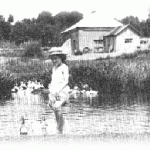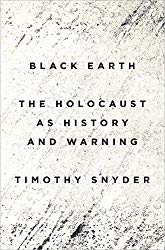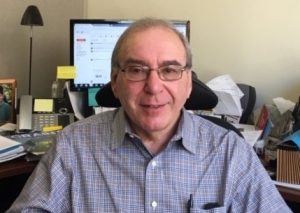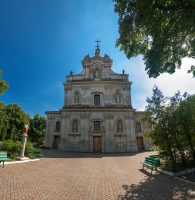
The Felshtin Society is named after a Ukrainian shtetl called Felshtin, which today is the town of Hvardiiske. The Felshtin Society began as a benevolent society organized in 1905 in New York City and is still active today.
In 1919 after 600 Jews perished in a brutal pogrom which took place in Felshtin, the society provided refuge and relief to the survivors. Next April, the Felshtin society will hold commemorative events to mark the centenary of this tragic historical event.
We first learned of these upcoming events as well as the past events, last March when we spoke with the president of the Felshtin Society, Alan Bernstein last week, Alan joined us to share some recent developments in their ongoing preparations, which the society is very excited about. One of these is a connection with locals in Hvardiiske, including a school principal and a Catholic priest who are eager to join in this commemoration to help shed light on their town’s Jewish past.
In part two of this interview, Alan shares more details about this and other connections recently made.
Pawlina: So you’ve been planning this … you said actually you started thinking about this six years ago, but plans have actually been going on for the past two years. And so you’ve got the location set and you’ve got the dates set and you’re planning the events as well. But you’ve recently put out this press release… and a really interesting and exciting development has happened in Ukraine. So tell us about the connection there.
Alan Bernstein: It’s fascinating because we don’t really know how it happened. So we’re kind of doing our own private detective work to find out exactly how this became to pass. We suspect that one of our members, one of our Felshtiners who actually was born in Felshtin and who grew up in Felshtin and whose family survived—even though there were Jewish, because they passed for Catholic.

Felshin’s Last Jew: Polina Lerner in Hvardiiske (formerly Felshtin) in 1957. Photo: Felshtin Society www.Felshtin.org
Pawlina: Oh!
Alan Bernstein: This lady—her name is Polina Lerner—went back to visit Felshtin this past spring. And I believe it’s as a result of her visit to Felshtin that the local Catholic priest got involved. And so I think that she happened to, when she was there, meet with the principal of the school, a fellow by the name of Yuri Federov. And they talked about what kind of sustained activities there could be that would bring the history, the full history, of the town to light for the school children. And they talked about the possibility of establishing a museum-type display in one of the corridors of the school where they have glass enclosed display cases. And wouldn’t it be wonderful if we could do a visual depiction of what the town was like 100 years ago!
Pawlina: Wow!
Alan Bernstein: … and talk about the Jews and talk about how things came to pass. Now they had that discussion. I believe that that discussion spilled over to the Catholic clergy. And then we got this wonderful letter from Father Peter who said to us that we’re going to have a memorial on the date of the pogrom where we pledged to have 600 people with candles lit in the town.
Pawlina: Oh Wow.
Alan Bernstein: And, we think that’s a very powerful thing and it’s a wonderful message for the town to send and for the church to become involved in. And for us to be able to feel that our ancestors will be remembered in that way on that day. So it’s a really wonderful thing. And we’re hoping to be able to work with other priests in the local area and maybe even get it to spread a little bit. For instance, Khmelnitsky, which is only about 12 or 15 miles away, might be another town where we could attempt to reach out to the local clergy and see if they wouldn’t participate. Khmelnitsky itself has a synagogue that we were establishing communications with. But we’re hoping that the activity of Father Peter will spread to other communities that suffered similarly in those days.
Alan Bernstein: And, we think that’s a very powerful thing and it’s a wonderful message for the town to send and for the church to become involved in. And for us to be able to feel that our ancestors will be remembered in that way on that day. So it’s a really wonderful thing. And we’re hoping to be able to work with other priests in the local area and maybe even get it to spread a little bit. For instance, Khmelnitsky, which is only about 12 or 15 miles away, might be another town where we could attempt to reach out to the local clergy and see if they wouldn’t participate. Khmelnitsky itself has a synagogue that we were establishing communications with. But we’re hoping that the activity of Father Peter will spread to other communities that suffered similarly in those days.
Pawlina: Oh yes. What a great gesture of reconciliation.
Alan Bernstein: Yes, I think so.
Pawlina: Yes. And maybe can we heal wounds of the past and move forward as, you know, I think people hoped over the centuries. So what is the name of this church?
Alan Bernstein: It’s Saint Wojczek Parish.
Pawlina: Okay. And it’s Roman Catholic?
Alan Bernstein: Yes. And Father Peter is also inviting the Eastern Orthodox clergy to participate as well.
Pawlina: Well, wow.
Alan Bernstein: So it’s not only going to be Catholic.
Pawlina: That’s amazing!
Alan Bernstein: And of course we’re hoping that we’re going to be able to get the synagogue in Khmelnitsky involved. We’ll see what happens. But it’s very, very wonderful and inspiring. So we’ve been reaching out to synagogues and Jewish organizations really pretty much all over the United States one at a time. We don’t, it’s not like we have a lot of staff. We have a few volunteers and you know, the people make calls. And people don’t get calls back. “But he’s busy.” Or “What is this all about?” They don’t really understand. And then we get a chance to tell people about what we’re doing and why we’re doing it.
Alan Bernstein: And so we’re hoping that this kind of activity will begin to appear on a wider scale, even locally in the United States. But we’ve already got commitments from some very significant organizations in New York City and New Jersey, Massachusetts, Michigan and Wisconsin. We have some organizations in Cape Town, South Africa that are participating. And then Alison can tell you more about Project Kesher and how they’re planning to work to participate with us. But we really felt that even though it’s kind of a David and Goliath story, that it was up to us to try to carry the ball and raise some awareness of these events that took place a hundred years ago that really should be remembered. That there was blood spilled and that it’s important that we remember that. And that we continue to stand up against this kind of hatred now and forever. So, we feel that even if it’s a small thing, whatever we’re doing is a step in the right direction.
Pawlina: Yes. If you don’t understand your past, if you don’t know where you came from, you won’t know where you’re going.
Alan Bernstein: And you said something before this that’s really very true. A fellow by the name of Tim Snyder wrote a book called The Black Earth, which is an absolutely fascinating perspective on how the Holocaust developed in eastern Europe. And his story is very, very akin to the kind of stories that emerged out of the pogroms. How the Germans were able to come into towns and enlist the assistance of local hooligans to run after Jews and others and perform a mass murders way before the concentration camps were established. So we see a great parallel between that and what happened in the Holocaust. And frankly, I think you’re absolutely right that we see a great parallel to what some of the things that are going on today throughout the world.
Pawlina: Yeah.
Alan Bernstein: We’re concerned. And we’re trying to use this event as a way of bringing forward some of these concerns in the light of history and in the light of what happened to our ancestors. And hopefully that there’ll be some potential for healing.
Pawlina: And what you said really hit home was that these occupying forces come from outside and they find the troublemakers to create more trouble. And if we don’t know our past, any one of us could be those hooligans or could be influenced by them to do wrong, to harm others where we normally wouldn’t. And I think if we don’t understand the stories of the past and recognize the patterns that caused these stories to repeat themselves, if we don’t recognize those patterns within ourselves, then we can’t hope to stop the pattern from repeating itself. So I congratulate the Society for staying together for so long for these over a hundred years and commemorating this event and educating the public with such a small group of dedicated people and at the Felshtin society.
Alan Bernstein: Well we’re doing the best we can. And it is an uphill battle.
Pawlina: Yes.
Alan Bernstein: And we are David and Goliath, there’s no question about it! But you know what? When we see this kind of thing happening, and we see things like Project Kesher and we can connect with them. And we see that Fr. Peter is taking a stand and Yuri Federov in Felshtin willing to embrace our story. And it gives us tremendous energy to keep on and continue to do what we can.
Pawlina: Well and certainly we’ll help you however we can to help get the word out and hopefully I’ll speak with you again. If there are any more developments, perhaps we can connect up with Father Peter in Hvardiiske.
Alan Bernstein: That would be wonderful.
Pawlina: It would! You mentioned Project Kesher and I think we’ll talk to Alison at length about that in a future episode of Ukrainian Jewish Heritage here on the show. But just give us an overview. What is Project Kesher?
 Alan Bernstein: It’s 180 women’s groups that are focused on trying to reestablish Jewish heritage, to form social networks of people who came from Jewish backgrounds. There are many people in Ukraine and in eastern Europe who survived the Holocaust, who survived the pogroms, who survived communism, who survived all these horrible things over the past hundred years and who have Jewish heritage and who are trying to reclaim that and who would like to reclaim that. So that’s pretty much the impetus of their efforts. I’m sure Alison will be happy to tell you more about it—how they operate and where they operate. With 180 groups—you know it’s really amazing that they have so many groups—but it’s kind of like when we were in Ukraine in 2010 to dedicate a monument in Felshtin. It was a similar thing insofar that in Khmelnitsky for instance, there’s a little community center that provides assistance. If people need it, they have a clothing exchange, they have furniture of exchange, they have a whole bunch of things, services that they provide to people in need. But it’s outreach. So, you know, we didn’t even know that they existed until we got to the synagogue itself, we really didn’t understand what it was really all about. But there are Jewish people there. There are people who are definitely interested in reclaiming their Jewish heritage. When we had a ceremony in 2010 to dedicate our monument in Felshtin, there was a whole group of Jewish men who came so that we could have a minion when we said the prayers over the stone. So it was really wonderful. And I think there’s a lot more of that type of social activity that’s going to be happening in the future.
Alan Bernstein: It’s 180 women’s groups that are focused on trying to reestablish Jewish heritage, to form social networks of people who came from Jewish backgrounds. There are many people in Ukraine and in eastern Europe who survived the Holocaust, who survived the pogroms, who survived communism, who survived all these horrible things over the past hundred years and who have Jewish heritage and who are trying to reclaim that and who would like to reclaim that. So that’s pretty much the impetus of their efforts. I’m sure Alison will be happy to tell you more about it—how they operate and where they operate. With 180 groups—you know it’s really amazing that they have so many groups—but it’s kind of like when we were in Ukraine in 2010 to dedicate a monument in Felshtin. It was a similar thing insofar that in Khmelnitsky for instance, there’s a little community center that provides assistance. If people need it, they have a clothing exchange, they have furniture of exchange, they have a whole bunch of things, services that they provide to people in need. But it’s outreach. So, you know, we didn’t even know that they existed until we got to the synagogue itself, we really didn’t understand what it was really all about. But there are Jewish people there. There are people who are definitely interested in reclaiming their Jewish heritage. When we had a ceremony in 2010 to dedicate our monument in Felshtin, there was a whole group of Jewish men who came so that we could have a minion when we said the prayers over the stone. So it was really wonderful. And I think there’s a lot more of that type of social activity that’s going to be happening in the future.
Pawlina: I think so. And the work that you’re doing, certainly will be facilitating that, that’s for sure. So thanks so much for telling us about your society, for sharing your story and this wonderful development, which hopefully we’ll be able to bring more information about the connection with the church and the original society of Felshtin in Ukraine. Thanks so much, Alan, for joining us! Hope to talk to you again soon.
Alan Bernstein: Well, thanks so much for having me. It’s been a pleasure and I look forward to it.
Pawlina: I’ve been speaking with Alan Bernstein, president of the Felshtin Society in New York. You can find the audio files and transcripts for both parts of this interview online at the Nash Holos website and the Ukrainian Jewish Encounter website. For more information about Felshtin, the Felshtin society, and next spring’s upcoming centenary commemorations. Please visit their website.
Thanks for listening. Until next time, Shalom!
Ukrainian Jewish Heritage is brought to you by The Ukrainian Jewish Encounter based in Toronto, Ontario. To find out more visit their website (here) and follow them on Facebook and Twitter.
![]()
Tune in to the Vancouver edition of Nash Holos Saturdays at 6pm PST on CHMB Vancouver AM1320 or streaming online. As well, the Nanaimo edition airs on Wednesdays from 11am-1pm on air at 101.7FM or online at CHLY Radio Malaspina. As well the International edition airs in over 20 countries on AM, FM, shortwave and satellite radio via PCJ Radio International.



